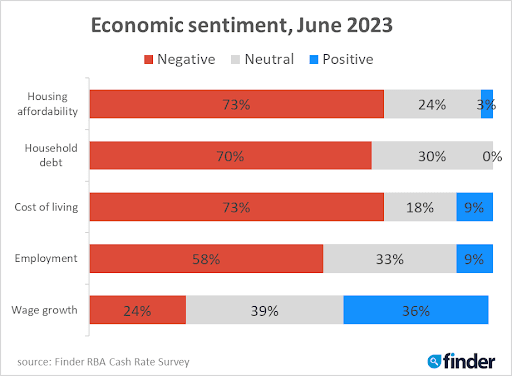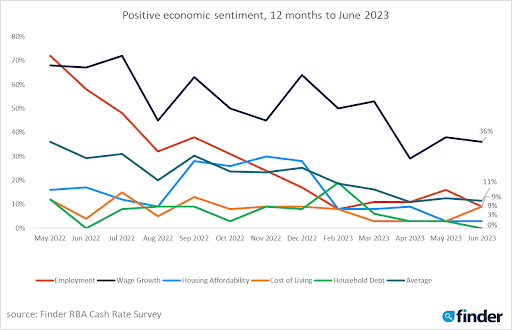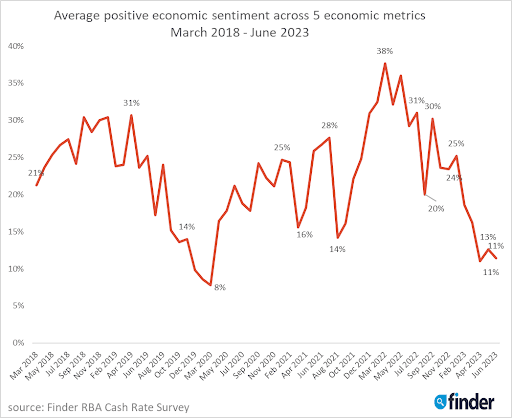Finder’s RBA survey: $15K (and counting) added to the average annual mortgage repayment

Homeowners across the country have been dealt a surprise blow from the RBA.
In this month's Finder RBA Cash Rate Survey™, 39 experts and economists weighed in on future cash rate moves and other issues relating to the state of the economy.
Nearly half of the panel (44%, 17/39) correctly predicted a cash rate rise in June, with the majority of those (15/39, 38%) accurately forecasting the increase of 25 basis points, bringing it to 4.10%.
Graham Cooke, head of consumer research at Finder, said the decision came as a shock to many.
"The RBA continues to operate in the dark, as our panel of economists are split on the bank's intentions.
"Aussies with an average loan size of $577K will be spending over $15K more per year on their mortgage compared to what they were in April last year.
"That's an additional $1,200 every month – a huge amount of extra money to be forking out on your mortgage.
"Finder's recent Cost of Living Report found that nearly 80% of Aussies are reducing their spending to cope with rising costs – the RBA's latest hike is likely to push that closer to 100%," Cooke said.
Average Aussie mortgage repayments
| Cash rate | Average home loan rate* | Average monthly repayment | Average monthly increase | Average annual repayment | Average annual increase | |
|---|---|---|---|---|---|---|
| Apr-22 | 0.10% | 3.45% | $2,575 | - | $30,900 | - |
| Jun-23 | 4.10% | 7% | $3,839 | $1,264 | $46,068 | $15,168 |
| (full rate rise applied) | ||||||
| Source: Finder, RBA. *Owner-occupier variable discounted rate. Repayments based on the average loan of $576,985 (ABS data analysed by Finder). |
Over two-thirds of panellists (67%, 26/39) believe the RBA will hold the cash rate in July.
Experts are then forecasting a slow decline in the cash rate. Almost 2 in 3 (64%, 25/39) predict the cash rate will begin to decrease between November 2023 and April 2024.
Cooke said the easing of cost of living pressures couldn't come sooner.
"It will be a relief to homeowners and renters to hear that this peak rate period should not extend beyond the first quarter of 2024."
38% of panellists say the federal budget was inflationary
Nearly 2 in 5 experts who weighed in* (38%, 12/32) believe the federal budget for FY 2023–2024 was inflationary.
More than half (56%, 18/32) do not believe the federal budget for FY 2023–2024 was particularly inflationary or deflationary.
Cooke said the budget received positive headlines on the whole, despite some thinking it could have done more and some thinking it does too much.
"Our panel assessed the budget fairly positively on balance.
"This may be enough to navigate us out of the cost of living crisis without fueling inflation further," Cooke said.
| Do you think the federal budget for FY 2023–2024 will be inflationary or deflationary? | |
|---|---|
| Neither | 56% |
| Inflationary | 38% |
| Deflationary | 6% |
| Source: Finder RBA Cash Rate Survey, June 2023 |
Interestingly, the majority of the panel (21/29, 72%) do not believe the budget should have included more spending to tackle the cost of living crisis.
Unpublished RBA research estimated an 80% risk of recession in 2023 and 2024, but an overwhelming majority of the panel (22/30, 73%) do not agree with this research.
Stella Huangfu from the University of Sydney said it is clear the federal government was very careful in its budget.
"The government is trying to provide financial assistance to targeted groups of people but at the same time avoid putting further upward pressure on inflation," Huangfu said.
Saul Eslake from Corinna Economic Advisory said the net impact of policy decisions in the budget is equivalent to just 0.2% of GDP.
"That's too small to have a discernible impact on inflation (apart from the 'mechanical' impact of the electricity bill subsidy)."
Experts are feeling more negative towards Aussie employment
Finder's Economic Sentiment Tracker gauges experts' confidence in 5 key indicators: housing affordability, employment, wage growth, cost of living and household debt.
Negativity towards employment jumped from 34% in May, to a whopping 58% in June. This coincides with a drop in positive sentiment from 72% in May 2022 down to just 9% in June 2023.
Negativity towards household debt and housing affordability has also increased, up to 70% and 73%, respectively.
Negativity towards cost of living remains high at 73%.
Average positive economic sentiment has dropped back down to a low 11%.



*Experts are not required to answer every question in the survey
Here's what our experts had to say:
Tomasz Wozniak, University of Melbourne (Increase): "Based on the new data from May, all my forecast systems are aligned and indicate a 15 basis point rise in the cash rate, with further increases expected throughout the year. The forecast intervals have also been narrowed to 3.9–4.1%, leaving little doubt about the projected raises. All this seems to be in line with the slowly falling inflation rate, which reached 6.8% in April. My forecasting system for this month includes 32 bond yield models for weekly and monthly data and 64 complex dynamic time-varying risk models encompassing the leverage effect and risk premium. The forecasts from individual models are further pooled based on their cash rate forecasting capacity."
Garry Barrett, University of Sydney (Increase): "CPI increase persistently high."
Mala Raghavan, University of Tasmania (Increase): "RBA is bound to increase the cash rate as all key economic indicators show signs towards tightening monetary policy. The inflation figure increased to 6.8% due to rising fuel prices, new dwellings and other essential items such as food and beverages, thus putting upward pressure on households' living cost index. Employment figures are pretty robust, with the unemployment rate hovering around 3.6% while the labour market participation rate remains at 66.7%"
Matthew Greenwood, University of Melbourne (Increase): "Inflation is stubbornly high and it is not forecast to return to the target range for a long time yet. The RBA may feel obliged to raise the cash rate further to ensure that inflation expectations remain anchored."
Nalini Prasad, UNSW Sydney (Increase): "Although inflation has moderated, it still remains at levels well above that seen prior to the COVID-19 pandemic. Of particular concern is services inflation which continues to be strong. Since labour is the main component of services, this points to higher labour costs. This would be concerning to the RBA."
Stella Huangfu, University of Sydney (Increase): "It is clear from today's CPI data that inflation is still far away from RBA's 2–3% target. There is no doubt that the RBA will increase the cash rate for the next two meetings, each time 25 bps."
Mathew Tiller, LJ Hooker Group (Increase): "The latest monthly CPI data indicates that inflation remains sticky, leaving the RBA with little choice but to raise the cash rate. Rapidly rising housing rents is one key driver of persistently high inflation levels and with a limited supply of new properties in the construction pipeline and rising population growth, it is anticipated to continue impacting the CPI for some time to come."
Jeffrey Sheen, Macquarie University (Increase): "Having raised the cash rate last month, and with the high inflation rate only slowly decreasing, the RBA is likely to increase the cash rate in June."
James Morley, The University of Sydney (Increase): "The fact that headline monthly CPI returned back up to a year-ended 6.8% for April provides clear cover for the RBA to raise the policy rate to demonstrate a further response to inflationary pressures. The monthly measure is somewhat volatile and is not completely comparable across each month of a quarter. So it is possible that the May reading will drop back down. The drop to 6.5% when excluding volatile items also provides some hope that future inflation releases will suggest a further easing of inflation and allow the RBA to hold in future meetings. Then I think the RBA may have to start decreasing rates by the end of the year if domestic demand deteriorates and the unemployment rate starts going up more rapidly. This is far from certain and a softer landing may still be possible. But it is a possibility."
Richard Holden, UNSW (Increase): "We are way behind in the fight against inflation. And our spread with the US is lowering the AUD and further fueling inflation."
Jonathan Chancellor, The Daily Telegraph (Increase): "The RBA is in the unenvious position of steering the economy away from its inflationary curse, and more needs to be done. Consecutive rate rises are needed, rather than its regrettable stop start course it had earlier this year."
Dale Gillham, Wealth Within (Increase): "The RBA tends to overshoot as getting the right balance is not that easy. Whilst the economy has slowed somewhat, it may not be enough and so I think the RBA will increase the rates by another 25 basis points."
Peter Boehm, Pathfinder Consulting (Increase): "RBA has clearly stated the fight against inflation continues as it remains stubbornly high."
Brodie Haupt, WLTH (Increase): "With services annual inflation recording the largest annual rise since 2001, it's hard to see the RBA not taking measures to curb it."
Associate Professor Mark Melatos, School of Economics, University of Sydney (Increase): "Inflation, especially the trimmed mean of the CPI, remains significantly above the RBA's target band. The RBA is still in catch-up mode with respect to matching their cash rate settings to the inflation reality. The RBA currently seems particularly concerned about services inflation and potential wage increases unaccompanied by productivity gains."
Cameron Murray, University of Sydney (Increase): "It's a guess. Hard to disentangle conflicting views and data at the moment. I thought the rate had peaked with the pause, but that proved to be wrong."
Jakob Madsen, University of Western Australia (Increase): "Inflation is still well above target."
Shane Oliver, AMP (Hold): "We think the RBA has already done enough with a high risk of recession which will knock inflation a lot lower. But the RBA's strong hawkish bias combined with still high inflation and upside risks to wages growth flowing from the Minimum Wage Case, high public sector pay and the tight labour market the likelihood is that it will raise rates further. We are now allowing for another hike in July but the risk is high that it could come this month."
Harry Murphy Cruise, Moody's Analytics (Hold): "Consumer confidence is in the doldrums and retail sales volumes are going backwards. That backdrop, combined with the falling core inflation figures, demonstrates that the Reserve Bank of Australia has done enough to temper demand. It is now a waiting game to see that flow through to inflation. We expect the RBA to keep rates steady in May and beyond. Rate cuts are on the cards from early next year. If the RBA presses on with rate hikes regardless, households could suffer more than necessary. For many, it would feel like an economic recession, even if population growth keeps aggregate GDP expanding."
Saul Eslake, Corinna Economic Advisory Pty Ltd (Hold): "Although the monthly CPI for April was higher than expected, after May's 25 basis point increase in the cash rate, monetary policy now seems sufficiently tight to provide reasonable grounds for thinking that it will decline to the target range."
David Robertson, Bendigo Bank (Hold): "The RBA board is likely to keep rates on hold at 3.85% in the June meeting with another pause to assess conditions, although it will maintain a tightening bias for some time. The latest monthly inflation data risks another hike to 4.1%, but this is more likely to occur around August (after the next quarterly CPI data)."
Craig Emerson, Emerson Economics (Hold): "The economy is slowing already with much more contraction yet to come through from previous cash rate increases. It's time to pause."
Tim Reardon, HIA (Hold): "Inflation remains well above RBA's target. A rate cut in mid-2024 is probable, but risk of embedded inflation now exists."
Cameron Kusher, REA Group (Hold): "I think from here rate changes will largely be determined by quarterly CPI. Over the month the labour market eased, retail trade slowed too, not much to suggest a need to tighten rates again this month."
Rich Harvey, Propertybuyer (Hold): "It is likely that inflation is not moving down fast enough with projected wage rises and other costs proving inflationary."
Adj Professor Noel Whittaker, QUT Business School (Hold): "The RBA is in a dilemma. As Michael Chaney of Wesfarmers just pointed out, inflation is ingrained for at least two years and nothing much the RBA can do will make much difference to it. Therefore, I think the bank will hold – I sure hope they do. There has been too much pain inflicted on mortgage holders already."
Tim Nelson, Griffith University (Hold): "RBA will hold to gather more information before acting further."
Jason Azzopardi, Resimac (Hold): "Further increases required to curb inflation which is clearly their objective above all other considerations."
Stephen Koukoulas, Market Economics (Hold): "Lower inflation and weaker economic growth."
Michael Yardney, Metropole Properties (Hold): "The RBA is receiving mixed messages about how quickly inflation is coming under control and is likely to take a breather this month."
Nicholas Frappell, ABC Refinery (Hold): "Inflation remains significant and the labour market tight so while the RBA may 'pause' there is a tightening bias."
Geoffrey Kingston, Macquarie Business School (Hold): "Credit is probably tight enough now to bring down inflation, although there is some chance of one or two further rises. Rates on track to come down next year."
Alan Oster, Nab (Hold): "RBA needs more flexibility re the inflation outlook. Getting inflation back to 3% by mid-2025 is too long. They need to lower the risk that that target may slip."
Andrew Wilson, My Housing Market (Hold): "Line ball decision – early signs of an easing in economic activity may encourage another pause – but inflation remains relatively untamed."
Anthony Waldron, Mortgage Choice (Hold): "I believe the Reserve Bank will hold the cash rate in June. The ABS's monthly CPI indicator rose 6.8% in the year to April 2023, but is still below the peak we saw in December 2022, which should hopefully give the RBA and borrowers some breathing room."
Evgenia Dechter, UNSW (Hold): "The RBA has indicated in the past that it will pause and evaluate its further steps."
Leanne Pilkington, Laing+Simmons (Hold): "After last month's rise we believe leaving rates unchanged at the June meeting is the prudent course. Removing the fuel excise anomaly, the most recent CPI data for April shows a continuation of the easing in inflation and as rental inflation remains a major concern, a further increase will hurt some sectors of the market more than others."
Nicholas Gruen, Lateral Economics (Hold)
Ask a question
